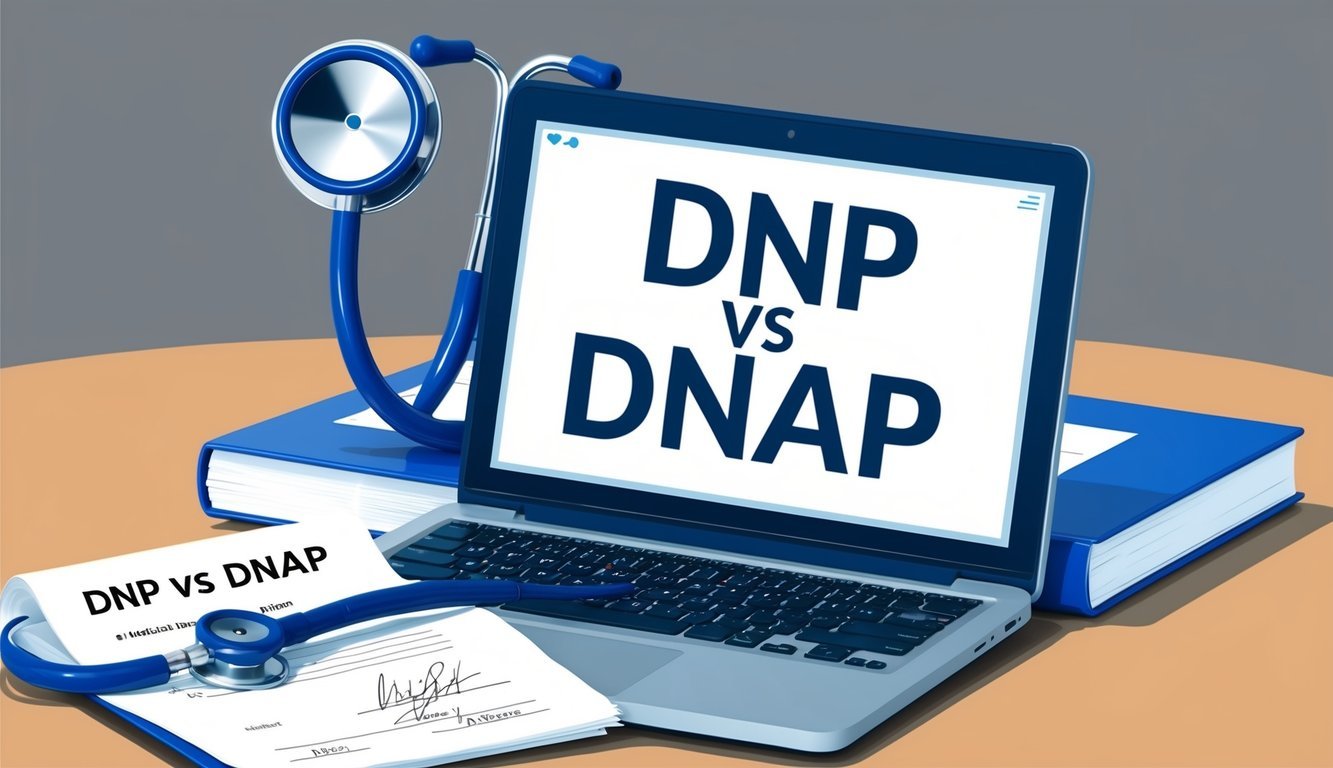When comparing the Doctor of Nursing Practice (DNP) with the Doctorate of Nursing Anesthesia Practice (DNAP), you may notice that the DNP emphasizes the application of evidence-based practice across various nursing settings.
Meanwhile, the DNAP specifically targets the field of nurse anesthesia.
Each degree offers unique benefits and career paths, making it crucial to understand which aligns best with your goals.
As you explore these options, you will discover how the curricula differ, what certifications are necessary, and the career outcomes associated with each degree.
Understanding these aspects can help you make a more informed decision about your future in nursing practice, whether you’re aiming to become a Certified Registered Nurse Anesthetist (CRNA) or advance your clinical expertise within broader nursing roles.
You will want to consider the emerging trends in healthcare, which often influence the demand for specific qualifications.
This information will be vital in shaping your career path in the evolving field of nurse anesthesia.
Key Takeaways
- DNP focuses on advanced clinical practice while DNAP is specialized in nurse anesthesia.
- Certification and licensure differ significantly between the two degrees.
- Career opportunities vary based on degree choice and trends in healthcare.
Foundations of Nurse Anesthesia

Nurse anesthesia is a specialized field focusing on anesthesia care, requiring advanced education and training.
Understanding the educational pathways and the role of Certified Registered Nurse Anesthetists (CRNAs) is essential for aspiring professionals.
Educational Pathways
To become a Certified Registered Nurse Anesthetist (CRNA), you begin with a Bachelor of Science in Nursing (BSN) degree.
After earning your BSN, you must gain experience as a registered nurse (RN), preferably in critical care.
Next, you pursue a Master’s or Doctorate degree in Nurse Anesthesia.
Programs typically require an active RN license and completion of an accredited nursing program.
You may choose between the Doctorate of Nursing Practice (DNP) and the Doctorate of Nurse Anesthesia Practice (DNAP).
These educational programs cover advanced pharmacology, anesthesia techniques, and patient safety, equipping you with the skills needed for clinical practice.
For more on the differences between DNP and DNAP, you can visit Nurse.org.
Role and Scope of Practice
As a CRNA, your role includes administering anesthesia for surgeries, managing airway logistics, and monitoring patient recovery.
You work in various settings, including hospitals, surgical centers, and pain management clinics.
Your scope of practice can vary based on state laws and healthcare settings.
Generally, CRNAs are authorized to make independent clinical decisions regarding anesthesia care.
This positions you as an essential member of the healthcare team, enabling collaborative approaches to patient care.
The demand for CRNAs is increasing, with a projected growth rate of 38% from 2022 to 2032.
This makes CRNA an in-demand career path with competitive salaries.
For more information about CRNA roles, visit Nurseonestop.
DNP vs DNAP Programs
When considering advanced nursing education, both DNP and DNAP programs offer distinct pathways.
Understanding their differences can guide your choice based on your career goals, academic needs, and future aspirations in nurse anesthesia practice.
Academic Curriculum
The academic curriculum for DNP and DNAP programs primarily focuses on different aspects of nursing practice.
-
DNP (Doctor of Nursing Practice) programs emphasize leadership, policy, and evidence-based practice. You will study topics such as healthcare systems, quality improvement, and advanced clinical skills.
-
DNAP (Doctor of Nursing Anesthesia Practice) curricula are tailored specifically for nurse anesthetists. You can expect in-depth coursework on anesthesia pharmacology, pain management, and advanced anesthetic techniques.
Both programs require a strong foundation in nursing, which typically includes a Master of Science in Nursing (MSN) and relevant clinical experience.
The key difference lies in the emphasis; DNP supports a broader nursing practice, whereas DNAP focuses on the specifics of anesthesia.
Clinical Requirements
In terms of clinical practice, both DNP and DNAP programs have stringent requirements.
-
DNP programs often require approximately 1,000 clinical hours, which may include a variety of specialties within nursing. This hands-on experience is crucial for developing leadership skills and advanced practice competencies.
-
DNAP programs take a more specialized approach, with clinical hours focused on anesthesia practice. A typical DNAP involves about 600 to 1,000 clinical hours that include direct patient care in anesthesia settings.
Both programs strive to meet the standards set by the Council on Accreditation of Nurse Anesthesia Education programs to ensure quality education and certification readiness.
Program Length and Structure
The duration and structure of DNP and DNAP programs can differ based on the institution.
-
DNP programs usually last 3 to 4 years for full-time students, depending on whether you pursue part-time or full-time study. The structure may include both online and in-person courses, allowing for flexibility in your schedule.
-
DNAP programs generally range from 3 years and often incorporate a mix of didactic learning and clinical practice, focusing entirely on anesthesia.
Each program structure aims to prepare you for your future role, whether in advanced nursing leadership or specialized anesthesia practice.
Be sure to check specific program details to ensure they meet your professional goals.
Certification and Licensure

Certification and licensure are crucial steps in advancing your career in nursing anesthesia.
To practice as a Certified Registered Nurse Anesthetist (CRNA), you must pass specific examinations and maintain your credentials through ongoing education.
Examination and Recertification
To become a CRNA, you need to pass the National Certification Exam (NCE) administered by the National Board of Certification and Recertification for Nurse Anesthetists (NBCRNA).
This exam tests your clinical knowledge and critical thinking skills.
Once certified, you must engage in recertification every four years to retain your CRNA credential.
This involves acquiring continuing education credits and passing the Certification Exam as part of your ongoing professional development.
You can learn more about these requirements by visiting the NBCRNA’s official website.
State Licensure
In addition to certification, you also require state licensure to practice.
Each state has its own board of nursing, dictating specific rules and requirements.
You will need to submit your CRNA certification along with proof of education when applying for a state license.
Many states require you to maintain both your RN and NP licenses as well.
To find detailed information about your state’s requirements, visit the American Association of Colleges of Nursing for resources and guidance.
Career Outcomes and Opportunities

Pursuing a Doctor of Nursing Practice (DNP) or Doctor of Nursing Anesthesia Practice (DNAP) opens up various career opportunities.
Understanding the statistics and salary expectations can help you make informed decisions.
Employment Statistics and Salary
The demand for advanced practice nurses, particularly Certified Registered Nurse Anesthetists (CRNAs), is high.
According to the U.S. Bureau of Labor Statistics, employment for nurse anesthetists is expected to grow by 40% from 2021 to 2031.
As for salaries, CRNAs earn competitive compensation.
Based on recent data, the average salary for a Nurse Anesthetist is around $91,509 per year.
This figure can vary significantly depending on factors such as experience, location, and type of clinical practice.
| Location | Average Salary |
|---|---|
| California | $150,000 |
| Texas | $130,000 |
| New York | $140,000 |
| Florida | $100,000 |
These statistics underline the favorable outlook for graduates in these programs.
Advanced Practice and Specialization
With a DNP, you can specialize in various areas of nursing, including population health and clinical practice.
This degree allows you to take on leadership roles and engage in evidence-based practice, influencing healthcare delivery.
Those who pursue a DNAP focus specifically on anesthesia practices.
This specialization qualifies you for advanced positions within surgical teams and critical care settings.
The Nurse Anesthetists Council of Accreditation emphasizes the importance of specialized training for CRNAs, allowing you to excel in a niche field.
In both pathways, career options extend to teaching, research, and policy-making, enhancing your ability to impact patient care and healthcare systems.
Emerging Trends in Nurse Anesthesia

Nurse anesthesia is evolving rapidly, influenced by evidence-based clinical practice and advances in technology.
Focus is increasingly on interprofessional collaboration and innovative patient care approaches.
Interprofessional Collaboration
Collaboration among healthcare professionals is essential in nurse anesthesia.
By working together, CRNAs, anesthesiologists, and other team members enhance patient safety and quality care.
You benefit from shared expertise, leading to better decision-making and outcomes.
Key aspects of interprofessional collaboration include:
- Team-Based Care: Integrated teams improve care coordination.
- Communication Skills: Effective dialogue minimizes risks and improves efficiency.
- Shared Goals: Unified objectives focus on quality and safety.
Training programs are increasingly emphasizing communication and teamwork skills to prepare practitioners for this collaborative approach.
Technological Advancements in Patient Care
Innovations in patient care technology are transforming nurse anesthesia.
Advanced monitoring devices allow CRNAs to track patient status in real-time.
This leads to timely interventions, enhancing patient safety and satisfaction.
Examples of technological advancements include:
- Remote Monitoring: CRNAs can supervise anesthesia from a distance.
- Data Analytics: Utilizing patient data can improve care strategies.
- Telehealth Services: Expanding access to anesthesia consultations enhances patient support.
By integrating these technologies, you can provide high-quality, efficient care, leading to better outcomes and patient experiences.
Impact on Healthcare Systems

The introduction of DNP and DNAP programs significantly influences healthcare policies and ethical practices.
These degrees shape the skills and knowledge of advanced healthcare practitioners, impacting care provision and administration.
Policy and Administration
Doctor of Nursing Practice (DNP) graduates are equipped to influence healthcare policy and administration.
They bring advanced skills in evidence-based practice, which helps improve patient outcomes.
DNP graduates often engage in roles that involve shaping policies, implementing best practices, and managing healthcare teams.
DNP programs emphasize leadership and advocacy, preparing you to address healthcare challenges effectively.
Practitioners with this degree can drive changes in healthcare systems, integrating the latest research findings into practice.
This leadership often leads to more efficient patient care processes and advanced management strategies.
Ethical Considerations in Anesthesia Care
In anesthesia care, ethical dilemmas can arise, and understanding these issues is critical.
DNP-prepared nurses are trained to navigate complex ethical situations, especially when making decisions that affect patient safety and care quality.
You may face scenarios involving informed consent, risk assessment, and end-of-life care discussions.
A solid grounding in ethics enhances your ability to analyze situations and make appropriate choices.
Knowledge gained from DNP programs encourages adherence to ethical standards, ensuring patients receive safe and responsible care.
Familiarity with ethical principles helps in discussing treatment options and fostering trust between you and your patients.
Frequently Asked Questions
This section addresses common inquiries about the differences and considerations between a Doctor of Nursing Practice (DNP) and a Doctor of Nursing Anesthesia Practice (DNAP).
You will find details about salary, educational requirements, costs, and career outcomes that can help in making informed decisions.
What is the difference in salary between a DNP and DNAP graduate?
Salaries can vary based on location, experience, and specific roles.
Generally, DNP graduates may earn between $90,000 to $130,000 annually, while DNAP graduates, particularly CRNAs, often earn higher salaries, ranging from $150,000 to over $200,000.
You can find more information about salary ranges in the nursing field on sites like Incredible Health.
What are the educational requirements to work as a CRNA with a DNP or DNAP degree?
To become a Certified Registered Nurse Anesthetist (CRNA), you need a master’s or doctoral degree in nursing with an anesthesia specialty.
A DNAP program requires an active CRNA license for admission.
For a DNP, you typically need a Master of Science in Nursing (MSN) and a Bachelor’s degree in nursing.
More details on program structures can be found at Nurse.org.
How do the costs compare between pursuing a DNP versus a DNAP?
The cost of pursuing a DNP can vary widely but generally ranges from $20,000 to $75,000 for the entire program.
Meanwhile, DNAP programs may cost more due to their specialized nature, with tuition averaging between $30,000 and $80,000.
It’s advisable to research specific program costs at various institutions to find the best fit for your budget.
Can an individual with a DNAP degree assume the title of ‘Doctor’ in a clinical setting?
Yes, individuals with a DNAP can use the title of ‘Doctor’ in clinical settings.
However, you must clarify your role and expertise to avoid any confusion with medical doctors.
The title is recognized in anesthesia practice, but communication with patients about your qualifications is essential.
What are the career outcomes for DNAP graduates compared to DNP graduates?
DNAP graduates are primarily prepared for clinical roles as CRNAs.
Many work in hospitals, surgery centers, or as independent practitioners.
Meanwhile, DNP graduates can pursue a wider range of roles, including leadership positions, policy-making, and advanced clinical practice.
Career paths can often overlap, but DNAP focuses more on anesthesia practice.
What are the differences in job responsibilities between DNAP-educated CRNAs and anesthesiologists?
CRNAs with a DNAP typically focus on administering anesthesia and monitoring patients during procedures.
Their responsibilities often include patient assessments and care before, during, and after anesthesia.
On the other hand, anesthesiologists, who are medical doctors, have a broader scope that includes diagnosing conditions, prescribing medications, and managing complex cases.
Each role plays a vital part in patient care.

